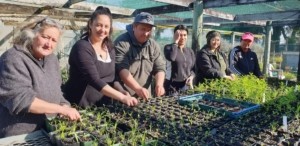
Weeding young natives growing in the nursery are, from left, New Zealand Certificate in Maori Environment Practices tutor Soraya Pohatu with students Mere Tamanui, Bailey Sadlier, Delecia Hooper,Jessie Walker and Davina Walker
A unique course using the Māori view on the state of the environment is gaining traction.
With courses run by EIT Tairāwhiti in Uawa, Gisborne/Manutuke and Mahia, New Zealand Certificate in Māori Environmental Practices tutor Soraya Pohatu gets around the region.
The courses are structured to suit the student’s schedules and they undertake a range of activities that look after the water and land around it.
“It is a practical-based course so we have to have a site where we can work and monitor and understand what is going on,” says Soraya.
First students look at their own whakapapa, the area they come from and the history of the area. “The whakapapa to the whenua develops the responsibility to kaitiaki because of that relationship.
They then identify the changes they have seen and look at the tributaries and other areas of impact to understand the whole system.”
For their monitoring work, the class from Uawa have created an app to collect data.
Pest trapping is an important part of protecting water and land and the Rakaukaka trapping programme has two years of data to draw from and add to. Water monitoring and soil testing are other skills students learn.
When they have done their foundation work, it is time to look at planting by the waterways. “We look at what plants go where and make a planting
plan, drawn up to scale. Then it is time for growing plants and learning about seeds – collection and treatment of them if needed and whether
to grow plants from cuttings or seeds.
Students say the skills they are learning lead’s to work, with one student recently getting a job on the Rongowhakaata Taiao (environment) Team.
“It also gives them the skills to manage their own land and improve the Mauri of the area so they can become self-sufficient,” says Soraya.
We teach our children – they have all come out planting and it builds a skillbase in each community”.
A highlight for student Jessica Walker was exploring her whakapapa. “Finding out where I come from because I wasn’t brought up amongest it.”
Bailey Sadlier says reconnecting and learning the traditional ways has been “very eye opening.”
Delicia Hooper says she is still learning a lot. “I am grateful for the space and opportunity to explore and learn.”
